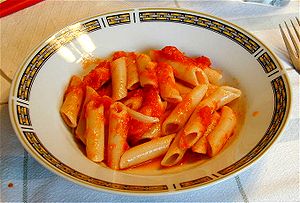Acid Reflux Disease Diet Recommendations
Friday, January 8, 2010
 Image via Wikipedia
Image via Wikipedia
Acid Reflux A Pain In Many Ways
You know how much pain and discomfort acid reflux can cause. To start with, there is the stomach discomfort you get when you consume a a food that gives you acid reflux, and then there is the discomfort in the esophagus as the reflux goes up the esophagus towards the mouth, where it can cause burning to the back of the throat too. Then there are the disturbed nights caused by the stomach fluids traveling the esophagus as you try to rest. It’s an unpleasant feeling that’s for sure, and there are so many more people affected by it these days too.
So how can you stop your acid reflux? Well the obvious thing is to stop eating the foods that cause you acid reflux, probably things like pizza which has both tomato sauce and lots of grease, which both can produce more stomach acid than you actually need. Now, not everyone needs to avoid all the same foods, some people have trouble with almonds, while others find almonds are beneficial for helping control their acid reflux. Garlic is another of those foods that helps some, but causes reflux in others.
Diet Tips To Help Your Acid Reflux Disease
The fact that acid reflux, affects not just adults, but also infants and children, makes it essential for everyone to be aware of its symptoms and how it can be prevented. Acid reflux can be controlled by changing your eating habits, not over eating and not eating certain foods.
Nevertheless, any person who is suffering from acid reflux needs a diet that would treat the illness, the foods that should be eaten and those which should not be. Below I outline some foods that probably should be eliminated from your diet all together, to get your acid reflux under control.
Acid Reflux & Heartburn : Things You Shouldn’t Eat With Acid Reflux
Foods that shouldn’t be eaten by people with acid reflux disease include tomato sauce, chewing gum, red wine and spicy foods. Discover how portion control may be a large factor in acid reflux withhelp from a gastroenterologist in this free video on acid reflux and food.
Read more...
![Reblog this post [with Zemanta]](http://img.zemanta.com/reblog_e.png?x-id=24246ed2-52b3-4204-823f-6ed2343be85b)

![Reblog this post [with Zemanta]](http://img.zemanta.com/reblog_e.png?x-id=181145d0-6440-48dc-a189-d0b6a6024253)

![Reblog this post [with Zemanta]](http://img.zemanta.com/reblog_e.png?x-id=591bdaf4-1f5e-495a-b727-c41983b8d1ba)


